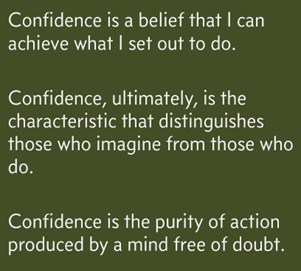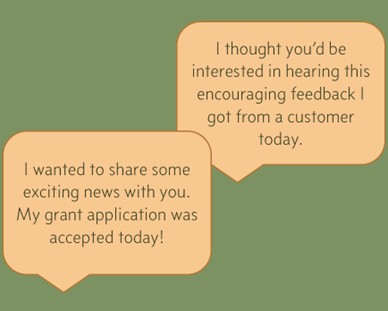This quarter’s Book Corner reviews Katty Kay and Claire Shipman’s book, The Confidence Code. Katty Kay is a British-Swiss journalist, author, and broadcaster, and Claire Shipman is an American television journalist. They co-wrote another book before this one, Womenomics, which sparked their desire to learn more about confidence. Although the authors focused on women and confidence, their findings offer ideas for all of us to consider.
What is Confidence?
A good place to start our discussion is by defining the term confidence. It’s not self-esteem, nor is it mere bravado. Look at these excerpts from the book, all of which define confidence:

What theme do you see in all three of these statements?
ACTION!
One of the authors’ major findings is that confidence requires doing stuff, as opposed to thinking about doing stuff. In other words, we need to lean in to action if we want to build our confidence.
Here’s another quote from the book to spur us to action: “In the most basic terms, what we need to do is start acting and risking and failing, and stop mumbling and apologizing and prevaricating.” The authors explain that it isn’t that we don’t have the ability to succeed; it’s that we don’t seem to believe we can succeed, and that stops us from even trying. Can you relate?
More specifically, the authors found that many of us tend toward perfectionism, like If I can’t do it perfectly, why try? That attitude leads to inaction, which robs us of opportunities for growth and confidence. But, the authors explain, if we don’t take risks, we’ll never reach the next level.
Think about how your work life might change if you made decisions with this in mind. It might mean you volunteer for more speaking opportunities, propose to lead more projects, mentor someone, or apply for more promotions. Imagine what could change!
What is Imposter Syndrome?
Kay and Shipman spend a portion of the book discussing imposter syndrome. They define imposter syndrome as the nagging feeling, despite reaching admirable heights in your career, that you’re about to be unmasked as an incompetent pretender.
The authors warn us that there’s a real danger with harboring this feeling: “When we feel like impostors, we don’t attribute our accomplishments to something internal and constant, such as talent or ability; instead we credit something beyond our control, such as luck. Rather than owning our successes, we distance ourselves from them. We deny ourselves the very support we need in order to thrive.”
So, let’s talk about the cure: The first step is to know that you’re not alone. Many people—like Maya Angelou and Albert Einstein—have felt what you’re feeling.
The second step is to think logically and realistically about yourself and your accomplishments. The authors quote Ryan Niemiec of the Values in Action Institute: “It’s transformative for people to actually focus on what their strengths are. Most of us have a kind of strength blindness.”
Are you blind to your strengths? Maybe it’s time to bring your perception of your abilities in line with your abilities. “Confidence occurs when the insidious self-perception that you aren’t able is trumped by the stark reality of your achievements.”
So, how do you do that? First, recognize achievements as achievements, not coincidences or luck. Then, promote yourself when you’ve had a success! Make your achievements known to your management team. Recognize and talk more about your successes. It reframes your thinking and leads directly to more workplace successes.
Here’s how that might sound in an email or a conversation:

Remember: Your employer wants to know about the good stuff you’re doing!
Your Call to Action
I’ll let the authors give you their call to action directly from the book: “If you only remember one thing from this book, let it be this: When in doubt, act.”
When we’re deciding whether to do something, we focus on either the potential benefits or the potential costs. If we are focused on the potential benefits, we’re likely to take the action. If we’re focused on the potential costs, we’re likely not to act, thereby avoiding the possible dangers.
So, the next time you’re faced with a work choice, focus on the potential benefits! You’re more likely to seize the opportunity.
Speaking of opportunities, here’s one for you! Join me virtually on May 2nd for my Women in Leadership class, “The Confident Professional”. I hope to see you there!

Allison Horak is a speaker, trainer, and attorney. She helps organizations work more effectively through better leadership and communication practices.

